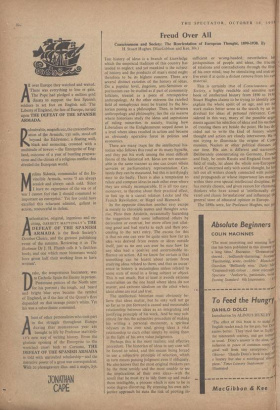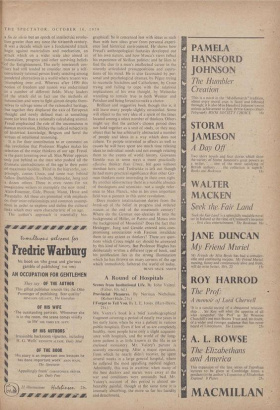Freud Over All
THE history of ideas is a branch of knowledge which the empirical tradition of this country has tended to neglect; and yet mankind is the subject of history and the products of man's mind ought therefore to be its highest concern. There are several distinct varieties of the history of ideas. On a popular level, jingoism, anti-Semitism or puritanism can be studied as if part of community folklore, treated as a piece of retrospective anthropology. At the other extreme the rarefied field of metaphysics must be treated by the his- torian posing as a philosopher. Then, in between anthropology and philosophy, lies the via nuestra where historians study the ideas and aspirations of ruling minorities in society, tracing how Liberalism or the Enlightenment seeped down to a level where ideas resulted in action and became an obviously operative force in politics and economics.
There are many traps for the intellectual his- torian who follows this road or its many bypaths, and they put his work among the most difficult forms of the historical art. Ideas are not measur- able in the same manner as one can count villein services or parliamentary representation. Cer- tainly they can be measured, but this is terrifyingly easy to do badly. There is also a temptation to relate and compare ideas to each other even where they are strictly incomparable. It is all too easy, moreover, to theorise about their practical effect, to link up in a causal relation Locke and the French Revolution, or Hegel and Bismarck.'
In the opposite direction another easy escape is merely to chronicle names and thoughts seria- tim, Plato then Aristotle, occasionally hazarding the suggestion that some influenced others by derivation or contrast, but more often just allot- ting good and bad marks to each and then pro- ceeding to the next entry. The excuse for this is that no one can ever be quite sure how far an idea was derived from events or ideas outside itself, just as no one can ever be sure how far any idea had a positive and ascertainable in- fluence on action. All we know for certain is that something can be learnt about actions from studying ideas related to them, and that an occur- rence in history is meaningless unless related to some slate of mind in a living subject or object. This is not much. But at least it avoids extreme materialism on the one hand where ideas do not matter, and extreme idealism on the other where ideas alone are real and true.
The intellectual historian must obviously be- lieve that ideas matter, but he may well not go so far as to put forward a causal and measurable relationship between ideas as an integrating and justifying principle of his work. And he may sub- stitute for this the subjective procedure of making his writing a personal encounter, a spiritual odyssey in his own soul, giving ideas a vital relationship to each other simply by seeing them in the light of his own value judgments.
Perhaps this is the most realistic and effective procedure. The historian of ideas in any case will be forced to select, and this means being forced to use a subjective principle of selection, which in turn means passing judgment even if obliquely. He also knows that the most original thinkers can be the most untidy and the most unable to see the implications of their own ideas—with the result that he must try to tidy them up and make them intelligible, a process which is sure to be in sonic degree distorting. By stressing his own sub- jective approach he runs the risk of proving in-
sufficient or wrong-headed; nevertheless I i5 juxtaposition of people and ideas, the traci of relations and contradictions through the 111 er of his own mind, may be stimulating and instrt e. live even if at quite a distant remove from his no' material.
This is certainly true of Consciousness and Society, a highly readable and sensitive teat, book of intellectual history from 1890 to 1930 Stuart Hughes claims to be trying to identify and explain the whole spirit of an age, and yet hiss work makes better sense as the search by an in dividual for ideas of personal relevance. Col' sidered in this way, many of the possible awl' ments against his selection of ideas and his method of treating them are beside the point. He has ( e' Bided not to write the kind of history where thought and action are closely interwoven. He is not trying to illuminate the origins of Com- munism, Nazism or other political diseases of our time. His aim is different and narrow 1. Deliberately concentrating on Germany, France and Italy, he omits Russia and England from his field of study, let alone the whole non-European world. Concerned only with social thought, he has left out all writers closely connected with politics and propaganda or whose importance lies mainly within their own special intellectual discipline. He has merely chosen, and given reason for choosin& thinkers who have aimed at 'intellectually e vated and classic formulations' and influenced tile general store of educated opinion in Europe.
The 1890s were, for Professor Hughes, not jtJ a fin de siecle but an epoch of intellecttial revolu- tion greater than any since the sixteenth century. It was a decade which saw a fundamental attack begin against materialism and mechanism, art attack which on a wider scale also aimed at rationalism, progress and other surviving beliefs or the Enlightenment. The early nineteenth cen- tury had still tended to consider man as a self- consciously rational person freely selecting among pondered alternatives in a world-where reason was triumphing over evil. Whereas after 1890 this notion of freedom and reason was undermined in a number of different fields. Many leaders of the attack did in fact use the methods of rationalism ism and were to fight almost despite them- elves to salvage some of the rationalist heritage, but together they displaced the axis of European thought and newly defined man as something more (or less) than a rationally calculating animal: Freud emphasised the role of the unconscious in human motivation, Dilthey the radical subjectivity If historical knowledge, Bergson and Sorel the virtues of intuitional reasoning.
It is for their contribution to or comment on this revolution that Professor Hughes makes his election of the major thinkers of our age. Freud. ih the giant towering over all. Max Weber appears only just behind, as the man who pushed all the dramatic contradictions of the age to their point )1* Maximum lucidity. Third in the hierarchy, sur- wisingly, comes Croce. and some way behind ollow Durkheim, Troeltsch, Meinecke, Jung and L dozen others. There is even room for six imaginative writers to exemplify the new trend : \lain-Fournier, Gide, Proust, Mann, Hesse and Pirandello. All these are presented with emphasis on their inter-relationships and common assump- ions in order to explore and define the cultural inks which may seem characteristic of an age.
The author's approach is essentially bio- graphical; he is concerned less with ideas as such than with how ideas grow from personal experi- ence and historical environment. He shows how Freud's anthropological fantasies developed out of his own nature, and how Mosca's views reflect his experience of Sicilian politics; and he likes to find the clue to a man's intellectual career in the scarcely articulated presuppositiOns and aspira- tions of his mind. He is also fascinated by per- sonal and psychological dramas, -by Peguy trying to reconcile Socialism and Catholicism, by Croce trying and failing to cope with the relativist implications of his own thought, by Meinecke wrestling to remain true to both Weimar and Potsdam and being forced to make a choice.
Brilliant and suggestive book though this is, it will leave many people slightly unsatisfied. Some will object to the very idea of a spirit of the times located among a select number of thinkers. Others might say that the author's chosen period does not hold together as a unit of study, or they may object that he has arbitrarily abstracted a number of people and ideas in a way which does not cohere. To people interested in effects as well as causes he will have spent too much time relating ideas to individual minds and not enough relating them to the events of world history. Giovanni Gentile was in some ways -a more practically effective thinker than Croce. but goes without mention here, and Treitschke is left out though he had more practical significance than other Ger- man thinkers more interesting in their own right. By another idiosyncrasy there is a notable absence of theologians and scientists—not a single refer- ence to Max Planck, who in his own important field was a pioneer in this same revolution.
Does modern totalitarianism derive from the break-up of the belief in progress and ordered reason at the end of the nineteenth century? Where do the German neo-idealists fit into the background of Hitler, or Pareto and Mosca into the background of Mussolini? Does the fact that Heidegger, Jung and Gentile entered into, com- promising associations with Fascism invalidate -them to any extent as thinkers? These are queS- tions which Croce might say should be answered by this kind of history. But Professor Hughes has deliberately written a different type of book, and his justification lies in the strong illumination which he has thrown on many corners of the age which immediately fathered the world of today.
DENIS MACK SMITH







































 Previous page
Previous page